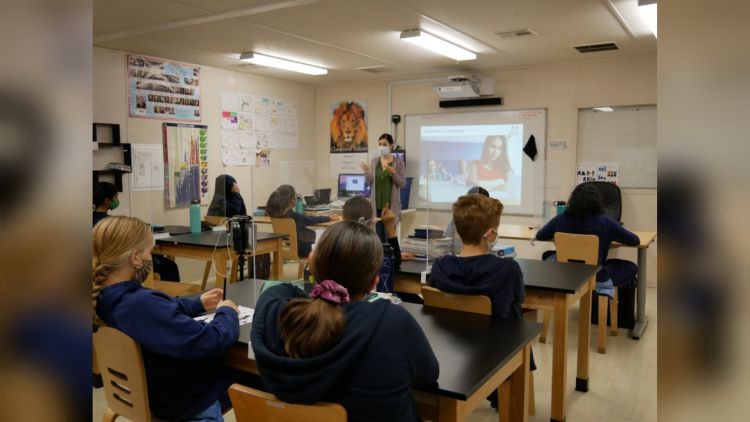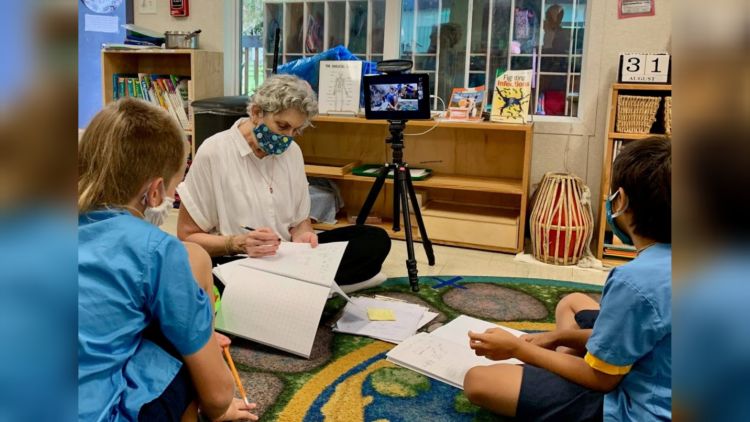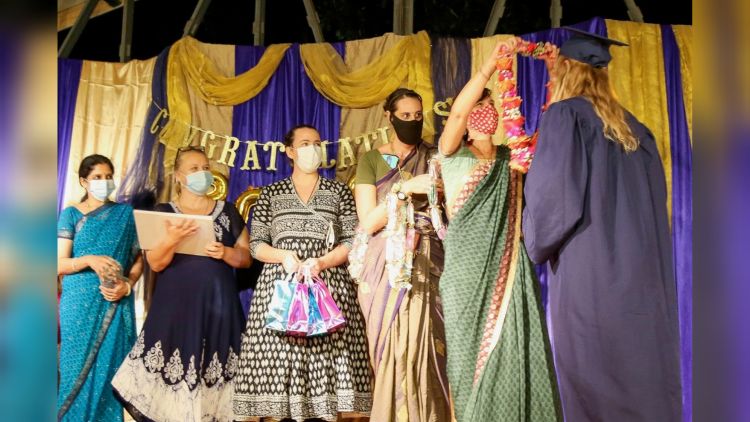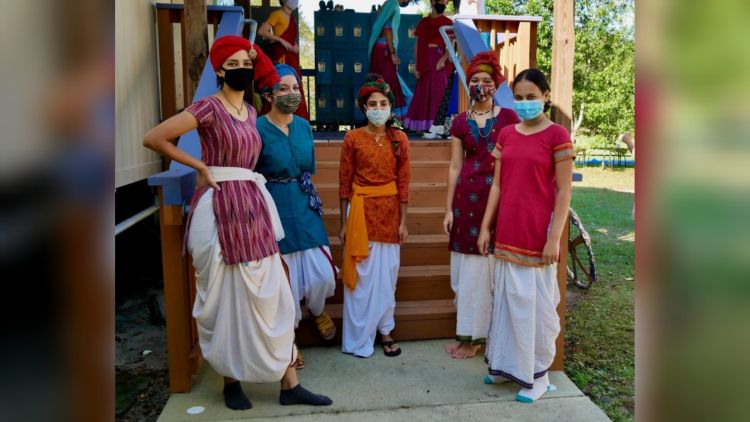Alachua’s Bhaktivedanta Academy Successfully Keeps Students Safe Throughout Pandemic School Year
By Madhava Smullen | Май 29, 2021

On June 4th, Bhaktivedanta Academy – a Montessori school serving the New Raman Reti community in Alachua, Florida – will reach a successful end to its most challenging school year so far. The heroic effort from teachers and staff has provided primary to high school age students with a safe environment in which their education and social and mental health has been cared for during the pandemic.
It all began in March 2020 when Covid first hit and the State of Florida kept schools closed after Spring Break, requiring Bhaktivedanta Academy to go virtual until the end of the school year. Students took classes via video on Google Meet, and did individual work at home which they sent in for evaluation. Screen time was adjusted depending on the age of the child. The switch was a major transition not only for students but also for teachers, as they did their best to provide continuity of learning and a sense of normalcy.
“The teachers weren’t spending as many hours directly teaching students, but they were spending a considerable number preparing for everything that students would need to learn from home,” says Principal Visvambhara Aguilera. “So when we did an analysis to see the amount of time required, they were actually spending more time working than they had in person.”
Teachers also provided as much family support as they could, making themselves available to troubleshoot situations at home for parents who had been thrown into a homeschooling role. And they were flexible, understanding that parents were doing their best in unique circumstances, and working with them wherever they were at.
During the summer of 2020, when there was little guidance yet from the state or federal level, Visvambhara and Bhaktivedanta Academy staff did their own research on how to keep safe if in-person schooling returned, drawing from trusted sources and school models that were then operating in Europe. So when school returned in August and the Florida state mandate was to have on-campus education, they were prepared.
Over the summer the school impaneled a medical team of practicing doctors and nurses that would evaluate safety standards. Finding that air quality was an important mitigation factor, staff had UV light systems and high quality media filters installed in the school’s central air conditioning units, as well as standalone air filtration systems in all the classrooms. They also programmed the AC so that air would constantly circulate, and installed plexiglass barriers between two-person desks.

Mother Satyaki gives a lesson with in-class and online students
When school started, mitigation protocols included students and staff wearing masks; parents checking off a list every morning showing that their children were free of Covid symptoms; temperature checks; and daily health checks and evaluations for staff.
In addition, each classroom was isolated as its own cohort, and teachers working in a particular classroom did not work with students in any other classroom.
“That way, if we ever had a Covid infection, we could isolate it to a particular classroom, and it wouldn’t affect the entire school,” Visvambhara explains.
The cohorts were a necessary but challenging shift for such an inclusive learning community as Bhaktivedanta Academy. “We pride ourselves on students from different classrooms interacting with each other and learning from each other,” Visvambhara says. “So it was an unfortunate byproduct of these measures that we weren’t able to do that this year.”
In addition, to ensure a ratio of one person for every six feet indoors, the middle and high school students, who previously shared a classroom for part of their day, had to do in-person classes part-time on different days. Middle school students would come in to class three days a week, and high school students two days a week, with the rest of their learning taking place online.
All these efforts, families were told, were for Covid mitigation, rather than prevention. “We know we can’t prevent it, but we can mitigate it and its impact on the school or on a classroom,” Visvambhara says. “And that was our focus.”
At the beginning of the school year, about thirty per cent of families opted to take the online schooling option provided for those who were concerned about having their children physically attend. Video systems were set up for at-home students in each classroom, so that they could participate along with their classmates. As the year went on, however, and it became evident that there was no Covid spread, these familes became more comfortable, and by mid-year Bhaktivedanta Academy was 100% on campus.

Jaya Sri Radhe, Krishna Sharanam Middle Years Programme coordinator, garlanding a student at Bhaktivedanta Academy’s Tenth Grade Graduation Ceremony
“We’ve mostly been able to operate without any disruption to learning,” Visvambhara says. “Throughout the totality of the school year, we’ve only had one class have to close for a one-week period because of a Covid concern. But in terms of health, we have not had any situations where Covid-19 has spread within a classroom environment. We’ve been able to keep everyone pretty safe.”
Meanwhile, going to school has actually benefitted children’s and families’ mental health. While there were concerns at first about how students would respond to having to wear a mask all day, according to Visvambhar they adapted very quickly without problems, and have had a generally good experience.
“The thing we noticed at the beginning of the school year was that the kids were so happy to be at school,” Visvambhara says, chuckling. “When we reopened in August, I had never seen that much enthusiasm for the first day of school, not only from students, but from the parents too!”
He adds: “I think just the opportunity for students to be able to interact with their peers, to be able to spend time together, to physically see each other, has been a huge thing. I cannot imagine what families have been going through in other parts of the country, where they have not had an option to have their kids physically in school, and they’ve had to completely adjust their lives so that their kids can learn from home.”
Although some staples of the Bhaktivedanta Academy experience have been missing this year – such as field trips, temple visits, and large performance events – it’s been an impressively normal school year considering the circumstances. In this, it’s important to acknowledge the commitment of the teachers and staff.
“We made our best efforts to plan how to operate the school at the beginning of the school year, at a time when there was still a lot unknown about Covid-19,” Visvambhara says. “And we did not have a single teacher who opted not to be in class. They felt that this was the best way for them to be able to teach students, and they wanted to be in class with their students, even though the risks were essentially unknown at that time. We have multiple teachers who, by age or other health conditions are considered to be in at risk groups. And they wholeheartedly committed to coming into this environment to teach, not knowing what the impact would be on them healthwise. So in my mind, they’re heroes. They really stepped up in a big way to be there for the students and their families.”

Krishna Sharanam Middle Year students dressed up for Spirit Day
Visvambhara also praises the students’ parents. “They were amazing, in terms of their willinginess to go through all the hoops we’ve had to establish on a daily basis, to ensure that everyone is coming to school healthy,” he says. “They were partners with us in keeping the school open, and creating as safe an environment as we could for their kids. The commitment, cooperation and support from families was a big part of this.”
Looking to the future, there’s reason to feel hope. Sixty per cent of Bhaktivedanta Academy’s staff are now fully vaccinated, allowing the school to relax its cohorts and vaccinated teachers to be able to collaborate with other classrooms as before. Additionally, vaccinated teachers don’t have to wear masks around students while they’re outdoors, and can refrain from using masks indoors when only other fully vaccinated teachers are present.
The pandemic has also given rise to new ways of operation that will remain useful even if and when restrictions relax. Virtual parent-teacher conferences, for instance, make it much easier for families to meet with their child’s teacher without having to schedule time off work and find a babysitter. Online communication tools have provided new effective ways for staff to work together. And staff are now much more adept at broadcasting virtual events, which will always – regardless of the Covid situation – be useful for parents who can’t take time off to attend every school function.
Next year, Visvambhara aims to resume plans for expansion that were put on hold in order to prepare for Covid. The expansion will increase Bhaktivedanta Academy’s capacity to accommodate families who are currently not able to enroll their children due to space constraints.
“It’s been a challenging year, in terms of the constant vigilance that we have had to hold, to ensure that we’re doing everything we can to have a safe and healthy learning environment,” Visvambhara says. “But I’m extremely grateful that by Krishna’s grace, He has kept us safe through this, and we’ve been able to operate like we have.”
During the summer, Bhaktivedanta Academy staff will consult national and state health department guidance, reconvene their medical team, and evaluate the best ways to keep everyone healthy into the next school year.
“That’s a big project for us,” Visvambhara says. “But we’re hopeful that the next school year will be closer to what normal used to look like than it is right now.”















